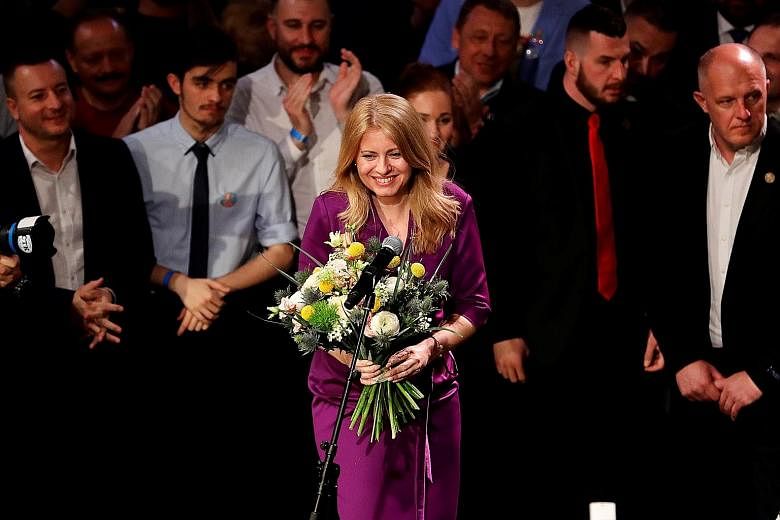BRATISLAVA (Slovakia) • In a stunning rebuke of Slovakia's populist governing party, Ms Zuzana Caputova - a 45-year-old lawyer, activist and political newcomer - was elected last Saturday as the nation's first female president.
Riding a wave of popular discontent over widespread corruption but refusing to engage in personal attacks on her opponents, she vowed to return a sense of decency to Slovakia's often toxic political climate.
Her sweeping victory in a run-off election gave hope to opposition parties across the region that the tide might be turning against the ethnic nationalist and populist movements that have swept to power in recent years.
"Maybe we thought that justice and fairness in politics were signs of weakness," she told a crowd of supporters around midnight. "Today, we see that they are actually our strengths. We thought that the barrier between conservative and liberal is unbreakable, but we managed to do it."
The country's official statistics office said that with 100 per cent of the vote counted, she led with 58 per cent over 42 per cent for Mr Maros Sefcovic, a career diplomat who had the backing of the country's governing party, SMER-SD.
Ms Caputova had never run for office and said in a recent interview she had not given the idea any serious consideration until last year.
-
58%
-
Ms Caputova's vote share after 100 per cent of votes were counted.
But she said she could no longer sit on the sidelines after a young Slovak journalist, Mr Jan Kuciak, and his fiancee Martina Kusnirova were shot and killed by a hit man hired to stop Mr Kuciak's investigations of corruption at the top levels of government.
She joined the tens of thousands of Slovaks who took part in street rallies in the weeks after the killings, the largest protests since the Velvet Revolution three decades ago helped Czechoslovakia, now the Czech Republic and Slovakia, break free from Communist rule.
For many who protested last year, the populism of the governing party - with its unrelenting attacks on immigrants and the European Union - had become little more than cover for corruption.
The organisers of the movement, however, deliberately excluded opposition politicians, wary of being tied to any political party.
Ms Caputova decided to join Progressive Slovakia, a new liberal party with no representation in Parliament, and champion a few simple ideas: civility in public life and transparency in government.
A divorced mother of two teenage daughters, she lives in Pezinok, a small town near Bratislava. Before her political rise, the town was known for two things: wine and the Pezinok landfill, a toxic dump.
In 1999, Ms Caputova joined the fight to hold those responsible for polluting the town to account.
For the next 14 years, she waged a war that she eventually won. It was that battle that led some to call her the Erin Brockovich of Slovakia.
She said the case had given her insight into how institutions work and how they can be abused. It also prepared her for the kind of personal attacks she would endure throughout the campaign. Above all, it showed that things can get better.
"Let's fight evil together," was her campaign slogan. In an interview, she explained that by "evil", she was not referring to individuals, but only the actions of those individuals.
She has managed to express outrage without rage, calmly calling for transparency, decency and fairness in politics and in public life.
Her opponents - in both the general election and the run-off last Saturday - reached for issues that have worked well in the past to draw out their most ardent supporters. Immigrants were called rapists. Gay men and lesbians were portrayed as a threat to traditional families.
The final results were a victory for a different brand of politics.
But the support enjoyed by her most extreme challengers, including avowed proto-fascist Marian Kotleba and anti-Nato Supreme Court judge Stefan Harabin - who together won more than 25 per cent of the vote in the general election - was a reminder that the country remains deeply divided.
NYTIMES

